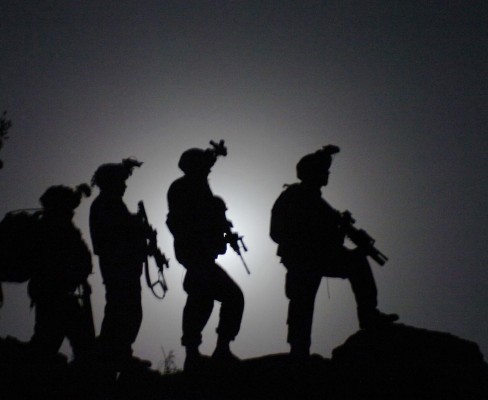
10 Reasons the Climate Crisis is an “Immediate Security Threat”
The Department of Defense 2014 Climate Change Adaptation Roadmap
www.NationalSecurityandClimateChange.org
1. Climate Change acts as a Threat Multiplier”
Climate change does not directly cause conflict, but it can significantly add to the challenges of global instability, hunger, poverty, and conflict. Food and water shortages, pandemic disease, disputes over refugees and resources, more sever natural disasters – all place additional burdens on economies, societies, and institutions around the world.
Climate change is a ‘threat multiplier’, as it has the potential to exacerbate many of the challenges we already confront today – from infectious disease to armed insurgencies – and to produce new challenges in the future.
2. Climate Change leaves our military’s bases, installations, and other facilities vulnerable.
These climate related effects are already being observed at installations throughout the U.S. and overseas and affect many of the Departments activities and decision related to future operating environments, military readiness, stationing, environmental compliance and stewardship, and infrastructure planning and maintenance.
3. Climate Change will affect the DoD’s ability to defend the nation.
Our coastal installations could be vulnerable to rising shorelines and flooding, and extreme weather could impair our training ranges, supply chains and critical equipment. Our militaries’ readiness could be tested, and our capabilities could be stressed
4. Climate Change will affect the deployment of U.S. Forces abroad and at home.
Climate change will affect the Department of Defense’s ability to defend the national and poses immediate risks to U.S. National security.
5. Increase demand for National Guard in the aftermath of extreme weather events.
Climate Change affects the availability of food and water, human migration, and competition for natural resources, the Department’s unique capability to provide logistical, material, and security assistance on a massive scale or in rapid fashion may be called upon more
6. Sea level rise threatens existing military bases.
Our coastal installations are vulnerable to rising sea levels and increased flooding, while droughts, wildfires, and more extreme temperatures could threaten many of our training activities. Our supply chains could be impacted, and we will need to ensure our critical equipment works under more extreme weather conditions.
7. Changing temperatures and lengthened seasons could impact operation timing.
Integrating climate change considerations into our plans, operations, and training across the Department so that we can manage associated risks. Considering the impacts of climate change in our war games and defense planning scenarios, and are working with our Combatant Commands to address impacts in their areas of responsibility.
8. Increased frequency of extreme weather could impact overflight possibility as well as intelligence, surveillance and reconnaissance capabilities
These climate trends will clearly have implications for our militaries. A higher tempo and intensity of natural disasters could demand more support for our civil authorities, and more humanitarian assistance and relief, drawing efforts away from intelligence gathering.
9. Supply chain and Acquisition complications
The Department depends upon the private sector for the manufacturing of its weapons systems and replacement parts. As the climate changes, this could place further hindrance on the distribution of supplies and impact future acquisitions of new equipment.
10. Alteration of operating environments.
As these operating environments change, so may the need for adjustments to Department Capabilities. The changing climate could present a different operational environment that our military has been traditionally trained to handle.

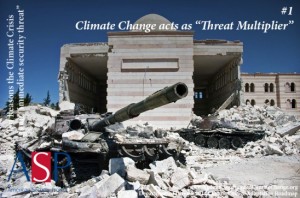
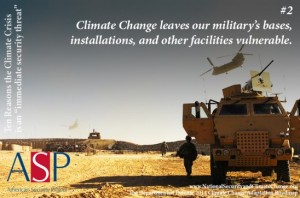
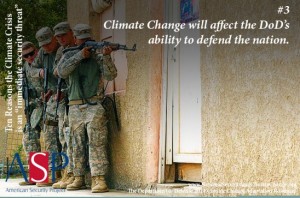
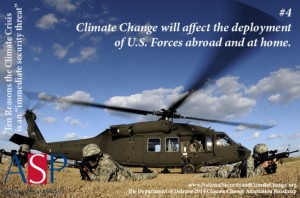
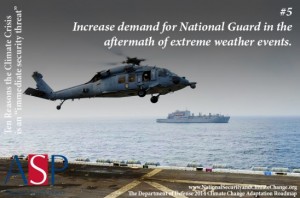
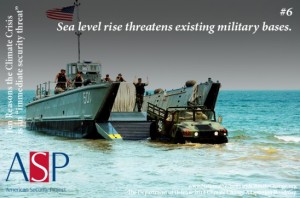
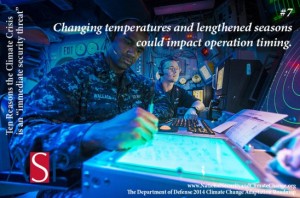
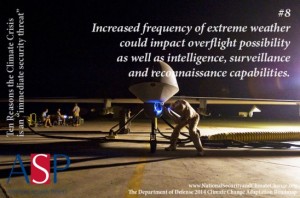
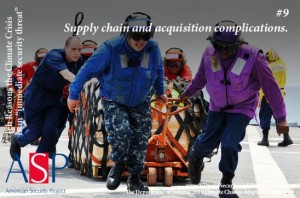
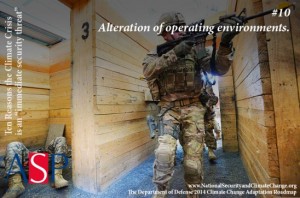





[…] 10 Reasons the Climate Crisis is an “Immediate Security Threat AJ Degarmo Egypt: A Work In Progress But Open For Business Giancarlo Lima Changes are underway in Egypt but the country requires extensive reforms if it is to have the long term growth that Egyptian society vitally needs. […]